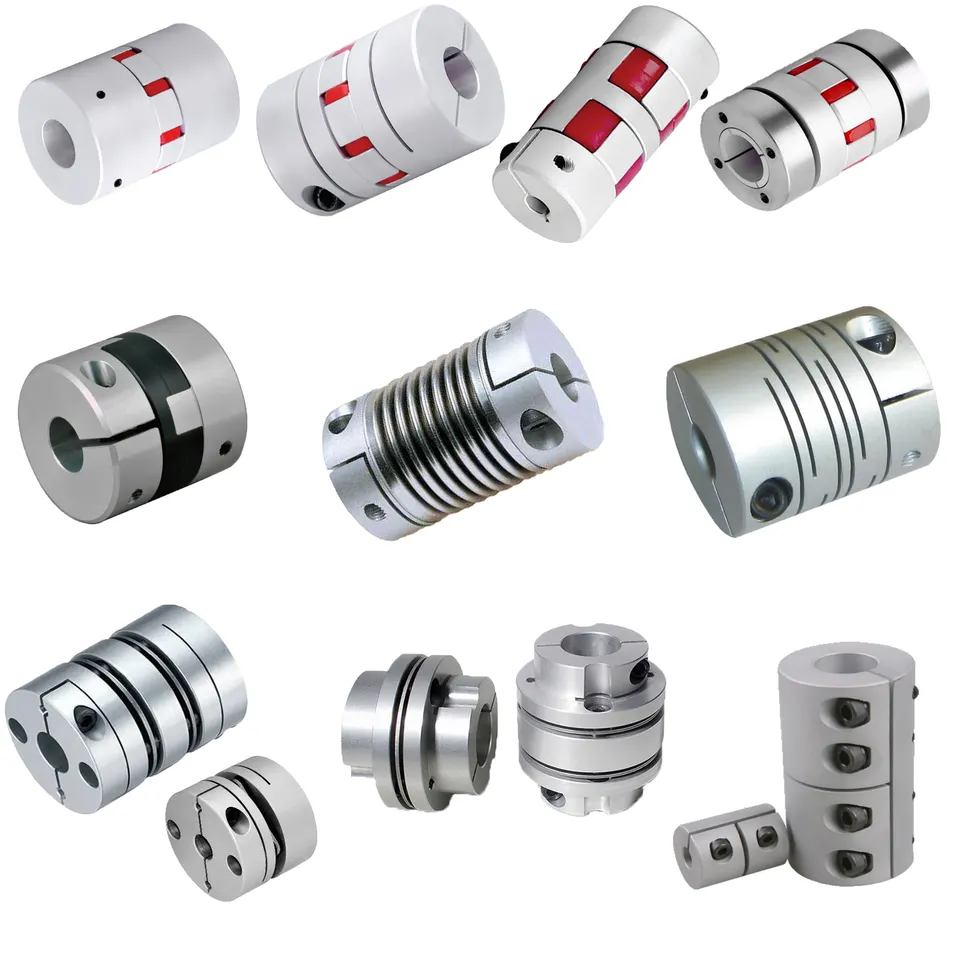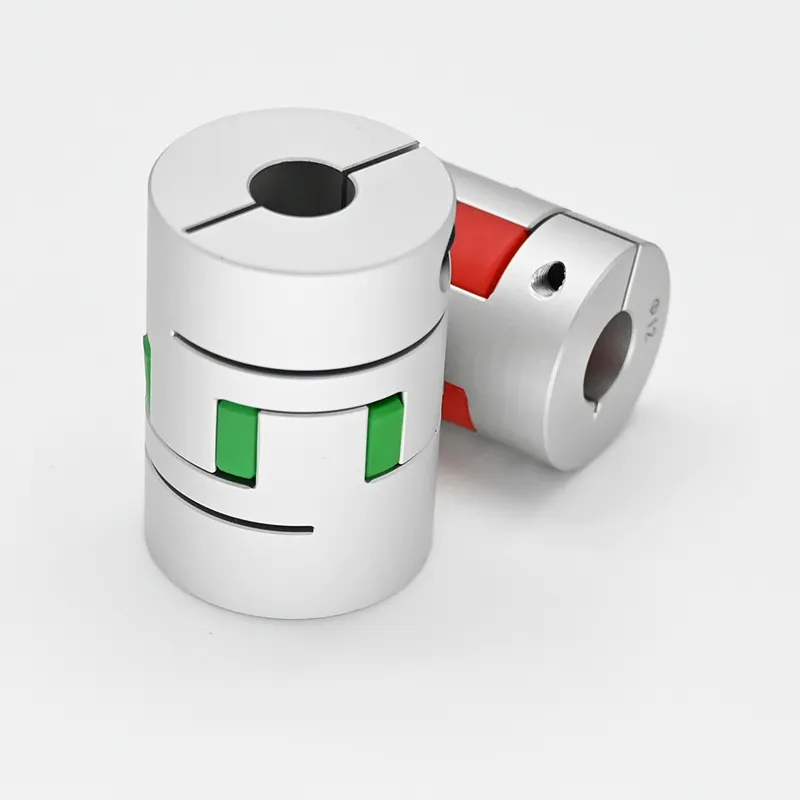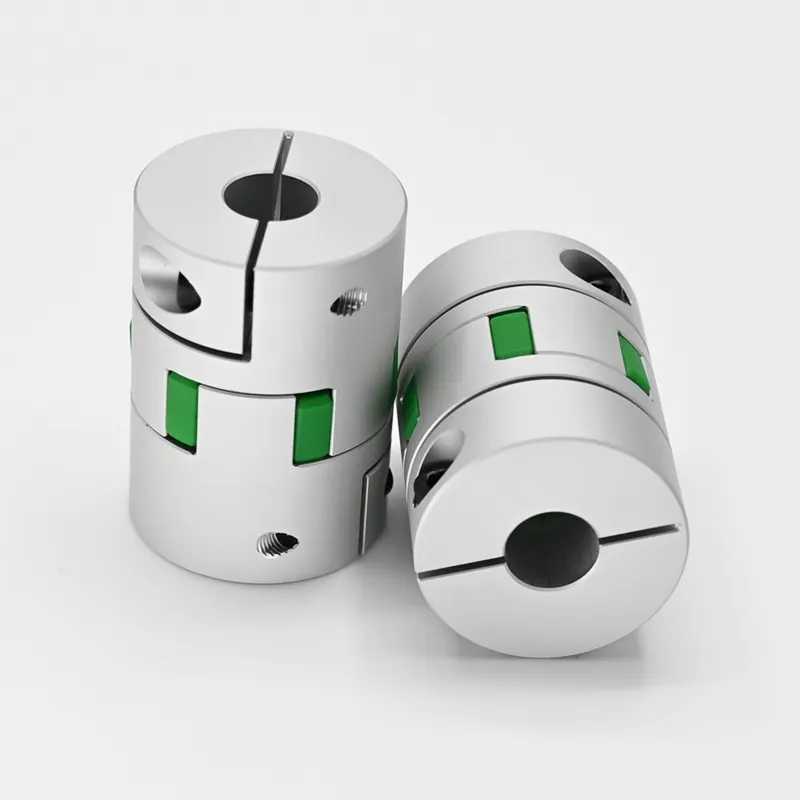Product Description
Description:
One of the most widely applied types of flexible couplings is an elastomeric design known as the jaw coupling. This design is characterised by 2 hubs, each having 2 or more thick, stubby protrusions around their perimeters, called jaws, pointing toward the opposing hub. These jaws mesh loosely when the 2 hubs are brought together. Filling the gaps between the jaws are blocks of elastomeric material, usually molded into a single asterisk-shaped element called a “spider”.
Just as coupling designs vary to satisfy different application criteria, so do the spiders in jaw-type couplings. The spider is the key determinant of the torque rating of each jaw coupling. It also can make a significant difference in the coupling’s response to vibration, temperature, chemicals, misalignment, high RPM, space limitations and ease of installation or removal.
Paramters:
Features:
1, Elastic plum-shaped flexible coupling
2,During transmission, it can realize zero backlash torque transmission torque under low torque state
3,The elastic spacer is made of polyurethane, and the torque exceeds the traditional claw coupling by more than 2 times
4,Plum CHINAMFG elastomer can resist oil and electrical insulation, operating temperature: -20ºC~80ºC
5,Excellent elastic effect to absorb vibration, eccentricity and deflection
6,If there are multiple deviations, the allowable value of a single deviation will be reduced
Packing & Delivery:
Application:
Building Material Shops, Manufacturing Plant, Machinery Repair Shops, Retail, Printing Shops, Construction works , Energy & Mining.
About us:
HangZhou CHINAMFG machinery technology Co., Ltd is an industry transmission solutions manufacuturer and service provider.
We offer 1 stop solution for power transmission products for different factories, such as chemicals, energy, material handling, environmental, extraction, pulp and paper, steel and metal, food and beverage, and construction industries.
We supply: Customised gears, Small gearmotors, Industrial gearboxes, Motors, Brand product sourcing.
Our industrial Gear, Gearbox, gearmotor and motor are sold to more than 30 countries. High quality, good price, in time response and sincere service are our value and promises. We aim at making happy cooperation with our customers, bring them reliable and comfortable service.
/* March 10, 2571 17:59:20 */!function(){function s(e,r){var a,o={};try{e&&e.split(“,”).forEach(function(e,t){e&&(a=e.match(/(.*?):(.*)$/))&&1

Impact of Jaw Coupling on Noise and Vibration in Mechanical Systems
Jaw couplings play a significant role in mitigating noise and vibration levels in mechanical systems. The design and materials of the coupling determine its ability to dampen vibrations and reduce noise. Here’s how a jaw coupling affects noise and vibration in a mechanical system:
- Vibration Dampening: Jaw couplings, especially elastomer jaw couplings, are designed to absorb and dampen vibrations that may occur in the system. The elastomeric spider element in elastomer jaw couplings acts as a cushion, absorbing shocks and vibrations that might result from misalignment, sudden starts, or stops. By absorbing vibrations, jaw couplings help prevent these vibrations from propagating through the system, thus reducing the overall vibration levels.
- Noise Reduction: The vibration dampening properties of jaw couplings also contribute to noise reduction. Vibrations can lead to mechanical noise, which can be particularly pronounced in high-speed applications. By reducing vibrations, jaw couplings help decrease the noise generated during system operation. This is especially beneficial in applications where low noise levels are crucial for the comfort of operators or nearby occupants.
- Misalignment Compensation: Jaw couplings are designed to accommodate a certain degree of misalignment between the shafts they connect. This ability to compensate for misalignment prevents additional forces and stresses from being transferred to the system, reducing the likelihood of generating noise and vibrations due to misalignment.
- Material Selection: The choice of materials in jaw couplings can also influence noise and vibration levels. Elastomer jaw couplings, with their flexible spider element, offer superior vibration dampening compared to rigid metallic jaw couplings. Metallic jaw couplings, while not as effective at vibration dampening, are more rigid and offer higher torque capacity.
Overall, jaw couplings are effective in reducing noise and vibration levels in mechanical systems. The extent of noise and vibration reduction depends on the specific design, material, and the level of misalignment the coupling can accommodate. Properly selected and installed jaw couplings can contribute to a smoother and quieter operation of the entire mechanical system.

Can jaw couplings be used in pumps, compressors, and fans?
Yes, jaw couplings can be used in pumps, compressors, and fans, and they are commonly employed in these types of rotating equipment. Jaw couplings offer several advantages that make them well-suited for these applications:
- Misalignment Compensation: Pumps, compressors, and fans often experience misalignment between the motor and driven equipment due to various factors such as installation errors, thermal expansion, or shaft deflection. Jaw couplings can handle both angular and parallel misalignment, ensuring smooth power transmission and reducing the risk of premature wear on the equipment’s bearings.
- Vibration Damping: Pumps, compressors, and fans can generate significant vibrations during operation. The elastomer spider in the jaw coupling acts as a damping element, absorbing and dissipating vibrations. This feature helps to reduce noise, extend the life of the equipment, and enhance overall system reliability.
- Torsional Flexibility: Jaw couplings provide torsional flexibility, which is beneficial in applications where the motor and driven equipment experience varying loads or torque spikes. The elastomer spider allows for slight torsional deflection, protecting the equipment from sudden shock loads and torque fluctuations.
- Compact and Lightweight: Pumps, compressors, and fans often have space constraints, and jaw couplings are compact and lightweight compared to some other coupling types. Their reduced inertia makes them suitable for applications with frequent start-stop cycles and high-speed operation.
Jaw couplings are available in various sizes and materials, allowing for customization based on the specific requirements of the pump, compressor, or fan application. The proper selection of a jaw coupling ensures optimal performance and efficiency in these rotating equipment systems.
However, it is essential to consider the specific operating conditions and torque requirements of each application when choosing a jaw coupling. For certain heavy-duty or high-precision applications, alternative coupling types such as gear couplings or disc couplings might be more suitable. It is always advisable to consult coupling manufacturers or engineering experts to select the most appropriate coupling for a given application.

What is a Jaw Coupling and How Does It Work?
A jaw coupling is a type of mechanical coupling used to connect two shafts in machinery. It is designed to transmit torque while compensating for shaft misalignments and dampening vibrations. The coupling consists of two hubs with three curved jaws each and an elastomeric spider placed between them.
The working principle of a jaw coupling is based on the flexibility of the elastomeric spider. When the two hubs are brought together, the spider gets compressed between them. The curved shape of the jaws allows the spider to flex, accommodating angular and axial misalignments between the shafts.
During operation, when torque is applied to one shaft, it is transmitted through the spider to the other shaft, enabling power transmission. The elastomeric material of the spider also acts as a damping element, reducing vibrations and shock loads in the system.
Jaw couplings are commonly used in various applications, such as pumps, compressors, conveyors, and other power transmission systems. Their simple design, ease of installation, and ability to handle misalignments make them popular choices for connecting rotating shafts in machinery.


editor by CX 2024-01-23